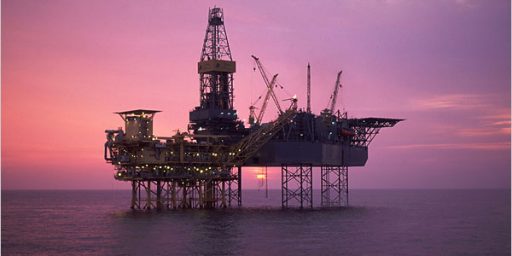How We Wrecked The Ocean
Alexander Klingman at Tired of Dystopia links the TED talk I’ve embedded below and simply says “I don’t really have comments here—it just speaks for its depressing self.”
I concur–and this talk was given before the Gulf oil spill.






When I was growing up, I learned to love the natural world by exposure to the forests and streams and great national parks. I loved to read or watch movies about our oceans and far away places which showed the beauty of nature and man’s rightful place in the scheme of things.
I still believe that this exposure instills a love for nature and an inspiration to good stewardship.
I don’t watch nature movies anymore or read much written lately, because they have all become instruments of those who preach nothing but fear, blame and despair.
These are people who will not allow a single word of optimism, hope or encouragement.
If they are right, then we need do nothing more than continue to decimate the environment and anticipate the end of civilization.
Ironically, this could accomplish just what the radical environmentalists really desire, an earth cleansed of the blight known as mankind,an Earth with no awareness left… trees falling everywhere and none making a sound.
Considering how badly we are fracking up the environment, these are not inapproiate.
Do you really think that none of the other creatures on earth have any awareness?
You claim to love nature. What’s your plan.. follow Sarah Palin and put your trust in the oil companies?
anjin,
I like the environment as well, but every time someone takes a shot at oil companies it comes across as unserious. Do we have a good alternative to gasoline as a transport fuel? We seem to monkey around at the edges a lot (hybrids, etc.) but haven’t developed a serious alternative. Until that occurs, we are stuck with the oil companies.
anjin,
Also, “Considering how badly we are fracking up the environment, these are not inapproiate.” is a common sentiment that doesn’t jibe well with reality. Things have been improving since the early 70s in a demonstrable fashion. Your comment makes it sound like our policies are getting worse when things have been improving for decades. Trying to keep people in a state of constant alarm makes them take you less seriously.
Now, global warming is a different issue….
I have not watched this video. I think I know how bad things are. Really bad. For Americans the state of the oceans are both the worst and most immediate environmental problem. They are simply devastated.
(I say “for Americans” because we’ve cleaned things up on land a bit. “For Chinese” the state of their rivers is probably more critical.)
If you don’t believe things are really bad, you probably need to read more widely, to build yourself a bigger picture.
Certainly don’t turn off all bad news as liberal propaganda, because that just means you can never know about any real problem.
Here’s a sad data point for your wider reading:
That is f’d up.
“Things have been improving since the early 70s in a demonstrable fashion”
In some ways, yes. The “government cant do anything right” crowd forget, or were not around when our air quality was much worse, our streams were more polluted and our roadsides were loaded with trash. In those areas, we have improved a lot, but those were areas that we could see and directly affected us. The oceans are another story. It is a real tragedy of the commons.
Steve
BTW, from my reading of the excellent book The Doryman’s Reflection, a “government messes things up” note:
A Fishing Act in the united states, timed with the expansion to a 200 mile limit, subsidized over-large fishing fleets.
Once we had a 200 mile limit, we said “let’s go catch them all” … and we did.
Robert,
Some things have been improving since the 70s. Smog. Some U.S. rivers. CFCs/ozone. Others, like the oceans, the rain forests, etc. have gotten much, much worse.
So, which 2 billion people do you propose we eliminate first?
Charles, there was a time when ocean calories changed our carrying capacity. Europe could not have had the population it had in the 15th century without the Portuguese cod fleets. (Another good book.)
I think those days are gone now, with the big easy fish. Can you think of a poor population that still survives on an ocean-caught fish diet? The few that there were were largely closed off in the last 50 years by European and Japanese fleets showing up on their door.
(Congrats though on jumping so fast to the “so we must kill humans to save nature” strawman!)
lol, a better question is which billion are we going to keep alive?
I, like Floyd, loved nature shows. His reason for no longer viewing them is sound, but mine is that they must continually spout a fabricated theoretical time line as the truth.
Donkeys show a we bit but there nature is contrary to the ability:)
The planet could probably support 20 billion vegans. That’s good news or bad news, depending on how you look at it.
Charles,
If we don’t rationally approach environmental problems instead of sticking our fingers in our ears and closing our eyes, we’ll be lucky if we only lose 2 billion.
Alex, Steve and John,
I get that there are problems with the oceans and much (though not all of it, like acidification) is a straight up property rights issue. I’ve seen suggestions, long before the recent blue fin tuna dust up, that we assign tradable quotas to fishermen, where their permit to fish becomes a valuable asset while at the same time stopping them from fishing species to extinction. I love that kind of stuff. We need to be doing it sooner rather than later.
Of course, it’s not that easy. We would need to get Europe to do the same thing (a treaty would be required) and stopping Japanese boats from overfishing blue fins in the north Atlantic would be a problem, since it’s international waters. Something along the lines of not letting them dock in any of our countries might help.
Anyway, I just wanted to explain that I do care about this stuff and we have made progress. Anjin’s statement just seems hysterical to me and keeping people whipped into a frenzy wears them out and makes them stop listening. The boy who cried wolf, etc.
Robert, as I understand it swordfish spend(*) part of the year of Maine (where they were traditionally caught by US fleets) and part of the year off the Bahamas (where they were traditionally “underfished”).
Do you really see that as a natural property rights issue?
(I think people who like property rights as their hammer have tried to see every resource as their nail. It doesn’t always fit.)
And the “cried wolf” thing is just the complain of a non-discerning reader.
* – should be past-tense “spent” as they are largely gone, killed not by people even in the swordfish game, but by long-liners after something else. Another example of the hammer not quite matching the actual nail.
PS. The only thing I have confidence in are “no take areas” AKA “marine preserves” and GWB gets props for creating some big ones … where it was politically possible and therefore not currently under much human demand.
Anything else, whether command-and-control limits or allocated (created) property rights all suffers from “the cookie jar problem.” Humans love to reach into the jar, for one more cookie, until they are gone.
see also:
No john personna, the sky has been falling forever, but the worst of it is that those proclaiming it the loudest (Rachel Carson, Paul Erlich, Al Gore, et alius) have been so egregiously wrong about so many things. The first Earth Day was about the impending Ice Age. Then it was global warming. Now to hedge their bets it is just climate change. Pardon me if those crying wolf about the population bomb, AGW, Peak Oil, the ozone hole, etc., no longer get my attention.
As Mr. Prather said, the danger of always declaring the end of the world if we don’t immediately respond to the crisis du jour by allowing some one world government to take over is that one day there will be a real crisis and no one will be listening.
Charles,
No, it wasn’t.
There is an ozone hole, which has not gotten bigger thanks to the global ban on CFCs.
Nobody’s saying that the catastrophic effects of AGW are happening tomorrow, but that the window in which we can prevent them is getting smaller. But it’s all a century out.
Overpopulation is still, potentially, a problem if climate shifts. Even without that, the amount of arable land shrinks every year as an inevitable consequence of agriculture. The entire Middle East used to be lush and green. Until agriculture.
These are all long term problems, but their consequences will be with us sooner than we think if we don’t take action to stop them.
Robert,
Privatization can definitely help solve some ocean ills, like overfishing. But I don’t see how it will solve trash dumping or fertilizer runoff.
Alex,
We agree. I didn’t say it would solve all problems, only the tragedy of the commons problem. BTW, I didn’t refer to it as privatization, John did. There may or may not be a market for fish farms of large fish, but we won’t know until a property right is established.
I don’t see a solution for fertilizer runoff or trash dumping that doesn’t involve the command and control type rules. If there’s a better way, I would love to know it.
John,
I’m surprised you would pull the old “hammer and nail” bit out when property rights are a classical remedy to the “tragedy of the commons” problem.
Also, what you are calling the “cookie jar” problem is simply an enforcement issue and it exists with marine preserves as well.
As for how swordfish are fished, yes it is still a tragedy of the commons problem.
John,
As for the issue of swordfish getting caught in nets when people are fishing for other fish, it would have to be addressed seperately. Something along the lines of turtle excluder devices could perhaps be used, but it would need to be looked at. You should probably stop using the “hammer and nail” metaphor; it doesn’t apply to what I’ve said.
Alex,
I just re-read my comment in response to yours and I should have said overfishing rather than “tragedy of the commons”. I hope that clarifies my position.
Heh, the hammer and nail seemed to hit a nerve.
Basically I think the oceans’ problems are different and more complex than economic or political bloggers dabbling in them admit.
It is true that a commons can be managed by market allocation, but history is rife with commons also managed other ways. It is also true that a commons which can be fenced or parceled and sold is a bit different than an ocean.
An ocean has complex mixes of migratory species and non. You can’t simply say “these are your thousand square miles.” You can’t even say “these are your fishing techniques.” The by-catch problem is huge.
Any real solution will have market components, but any real solution will also need folks with more tools in their box … and not just people who keep using that hammer, even as they claim the metaphor is misapplied.
BTW to Charles, I think it is simply true that we are living in a major extinction event. The numbers support that.
Now, as to how bad we should feel about it … some days I just give us humans all a break. We obviously aren’t smart enough “stewards” to really deal with it, are we? So why not order seafood tonight right? Everyone else does …
John,
For the sake of clarity I will explain this again. The metaphor doesn’t apply because I never said the only thing that would be done is to have tradable permits, nor did I ever say that the tradable permits would solve all problems, only overfishing.
In addition, you seem to think of property rights in terms of things you can draw squares and rectangles around. I said above that there might be farming of fish, but the property I have been referring to is the PERMIT. That’s it.
I’m getting you then, Robert.
I think the tragic bit you don’t get (but you might with the books I recommended above) is how often managed fisheries fail. They fail under permit, they fail with IFQs, they fail for all kinds of reasons …
Well, I think there is one central reason. We don’t actually know fisheries as well as we think we do, and yet we desire to take fish right up to the limit. Fishers ask for ever more, and the biologists try to give them more, right up to maximum sustainable yield (MSY).
I did a little computer model once. I set a fishing to quota model, and they put in a +/-5% error on each year’s estimate of MSY.
On every run my toy fisheries crashed within 100 years. Why? For the same reason retirement portfolios need to be overlarge … in an iterative system loses have an asymmetric impact.
It’s not surprising then that a species that is heralded as a success of fishery management crashes 5 or 10 years later. Riding the knife edge, trying for maximum resource extraction, will do that to you.
BTW, it is of course even more tragic when we don’t put any limit, of course. It’s worse when we talk about this, and then go for sushi. But, that’s who we are.
Natural gas probably deserves a hard look. As does public transportation. Every advanced country I have ever visited has good to excellent public transportation. Yet the richest, most advanced country in the world does not. Could it be because the oil companies, who along with GM destroyed our fine public systems after WW2 have too much to loose from a change in the status quo?
Such a ludicrous, and pretty much incorrect over simplification of a complex problem will make people take you less seriously. In some parts of the U.S. things have improved. Certainly here in the SF Bay Area we have made great progress with wetland restoration.
But we are rich, and can afford such things. Most of the world is not, and cannot, hence their ecosystems are going south. The fact that we have improved things here by exporting our garbage there is not helping them a bit.
As for the oceans, well, here are a few links:
http://www.mindfully.org/Plastic/Ocean/Moore-Trashed-PacificNov03.htm
http://www.wendmag.com/greenery/2010/02/real-time-notes-from-the-atlantic-gyre-windrows-to-the-future/
I can provide documentation about how badly we have screwed up the environment pretty much endlessly. Why don’t we start with the 2 links I posted above. You can read them, and they explain how things just aren’t that darned bad, and then we can go forward from there.
Here is some recommended reading. Pay attention to what happened to Easter Island. There are some interesting lessons there for the modern world.
http://www.amazon.com/Collapse-Societies-Choose-Fail-Succeed/dp/0143036556/ref=sr_1_1?ie=UTF8&s=books&qid=1273459078&sr=8-1
20 billion vegans bedamned… who’s going to tell them what’s in Soylent Green?!
Anybody notice the guy looks like David Brenner, only twice as ugly and half as funny?!